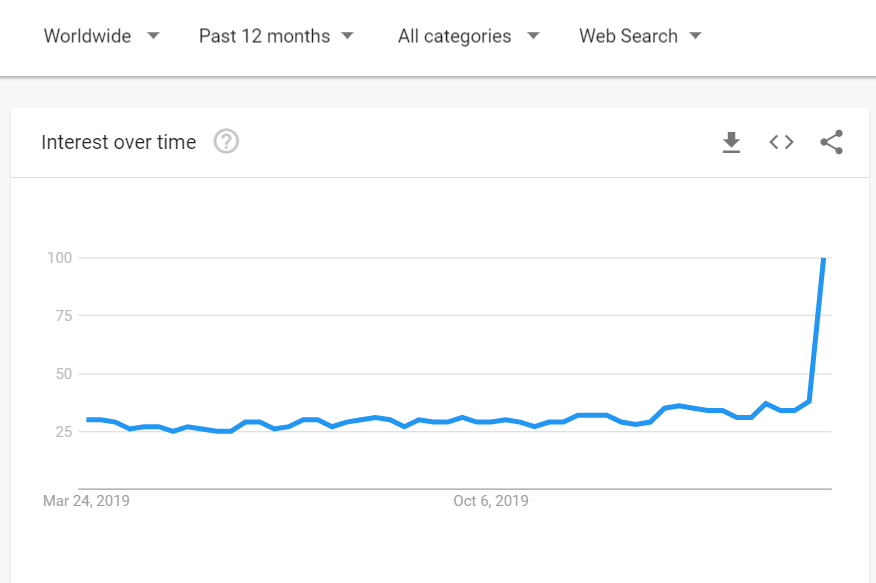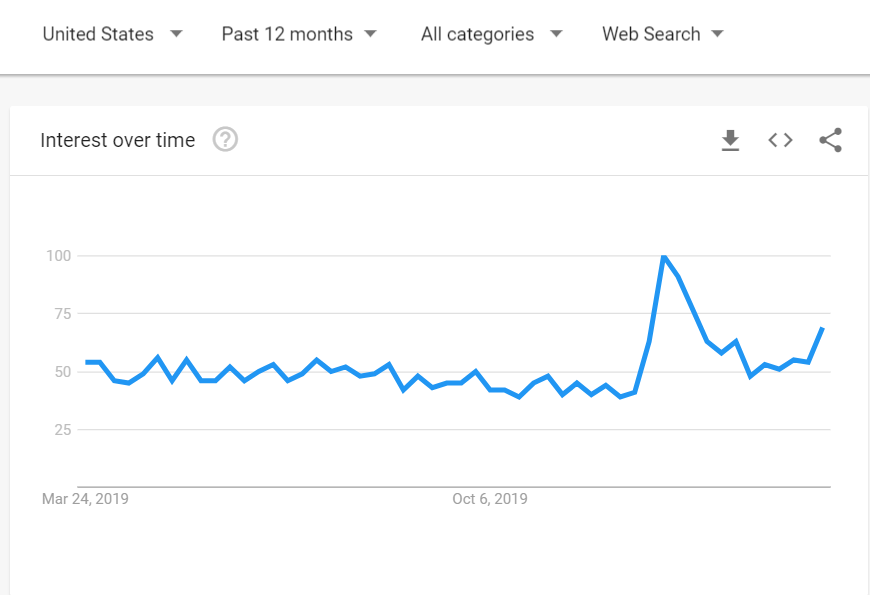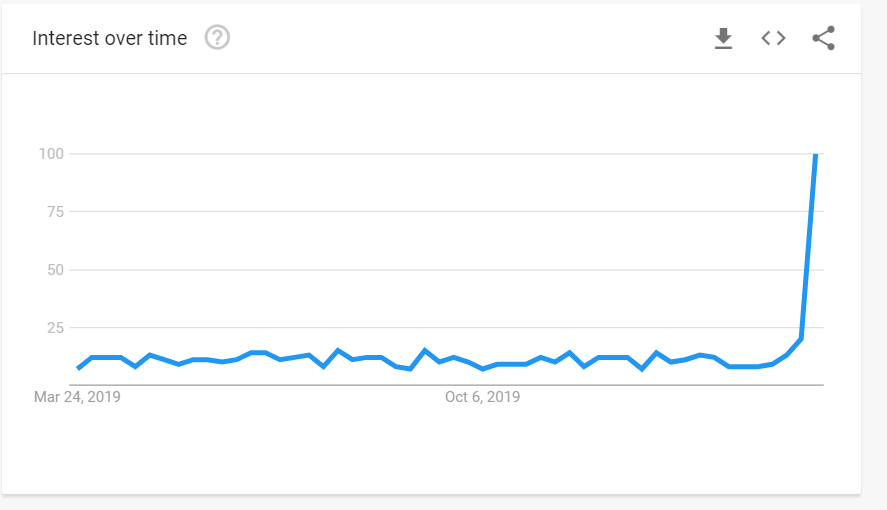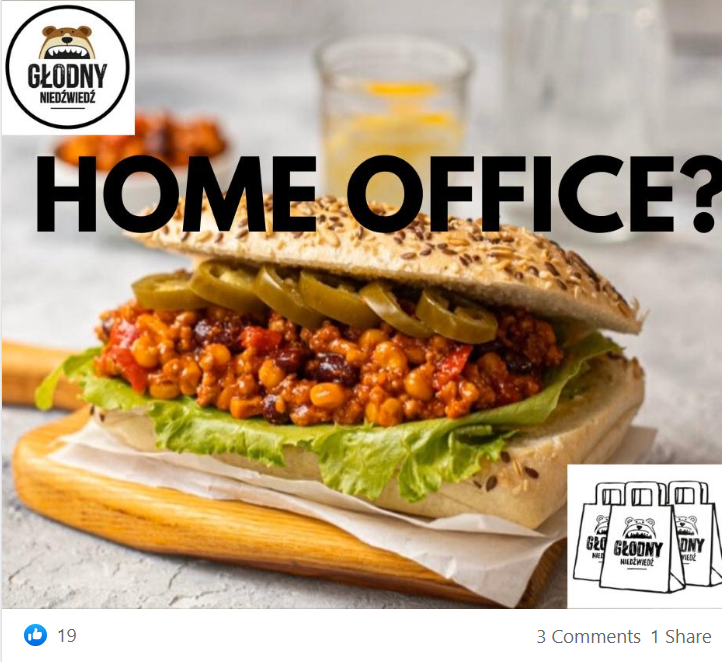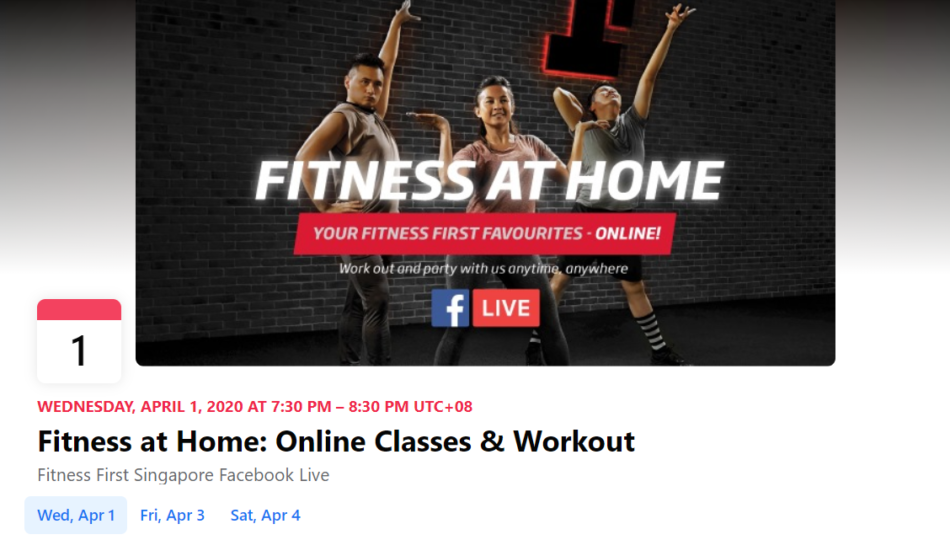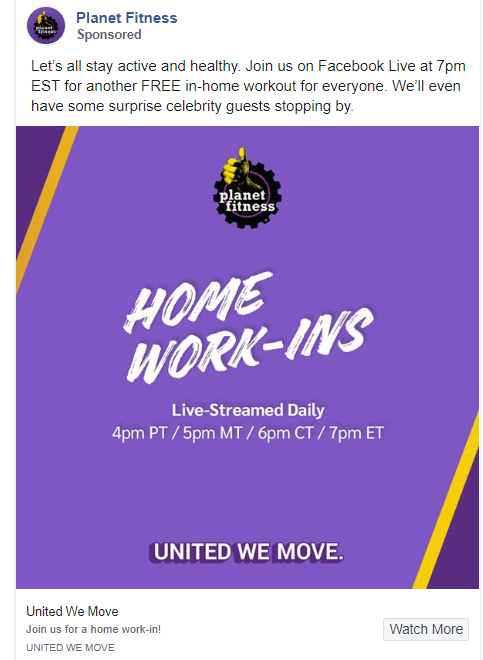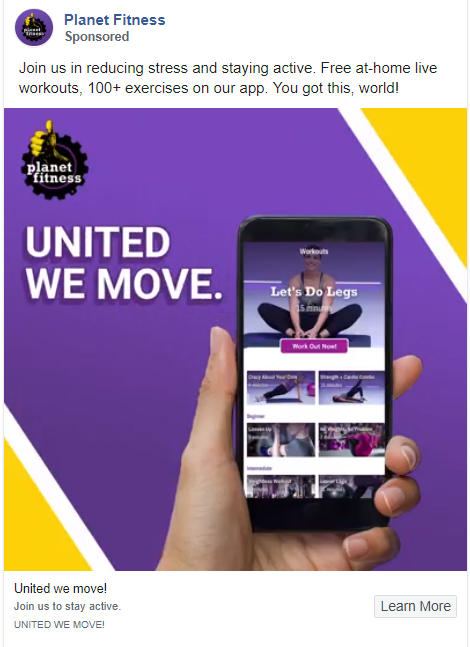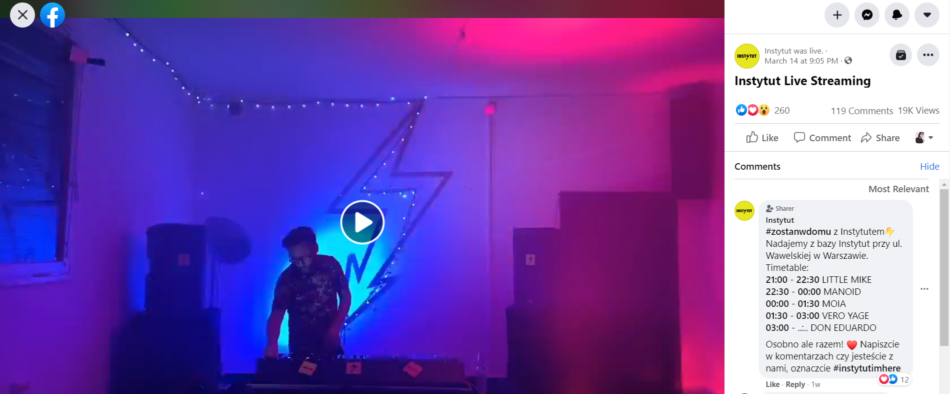There’s no doubt that the COVID-19 pandemic has changed the way businesses are operating right now.
Consumer behavior is changing rapidly, and we don’t know whether these are long term changes. This means that the demand for many products and services has also changed. Some businesses are trying to survive while others are seeing an increase in sales and interest.
How businesses can adapt during Coronavirus
Although your business might be facing many obstacles, there are also ways to overcome them. Many of those opportunities can be realized by utilizing social media platforms or adapting your current business model to an online one. We’ll be going over examples of successfully applied changes by other companies as well as the best practices that you can implement.
As a research company, we can use our access to resources and expertise in social media, analytics, and marketing to report on the facts. Our analytics team can prepare aggregated data to give you insight into how your audience and their interests have changed. You might be able to use this data to make changes in your business model and online marketing strategy to fit their needs and behavior at this point in time.
In this article, we’ll go over:
- the overall impact on eCommerce
- the effects on different industries
- how businesses can adapt with the help of social media
Facebook and Audience Interests
Brands are trying to find out to what extent their audience demographics and target groups have changed. Knowing this crucial information can help them decide whether they should increase or decrease activity and spending on Facebook to appeal to their new audience.
Sotrender is paying close attention to the situation and regularly monitoring behavior and attitudes of Internet users. Moreover, Google search phrases that Sotrender is monitoring have in several cases experienced changes reaching up to a few hundred percent.
To further investigate the changes, we prepared the Audience Interest Analysis to gain insights about consumer behaviors and interests over time. Our analysts and data scientists utilize Artificial Intelligence (more specifically, Machine Learning) within the context of natural language processing (including topic modeling and sentiment analysis).
We’ve gathered this reactive data from the following sources:
- Interests and lifestyle based on Facebook API data
- Topics and phrases searched in Google
- Online reviews, comments, and user-generated content (social listening, earned media)
- Brands’ and influencers’ activities on their own channels (owned and paid)
This contextual analysis helps us track trends and any changes about a specific brand or subject.
Here’s what we know so far about the changes in Facebook interests from 2019 up until now.
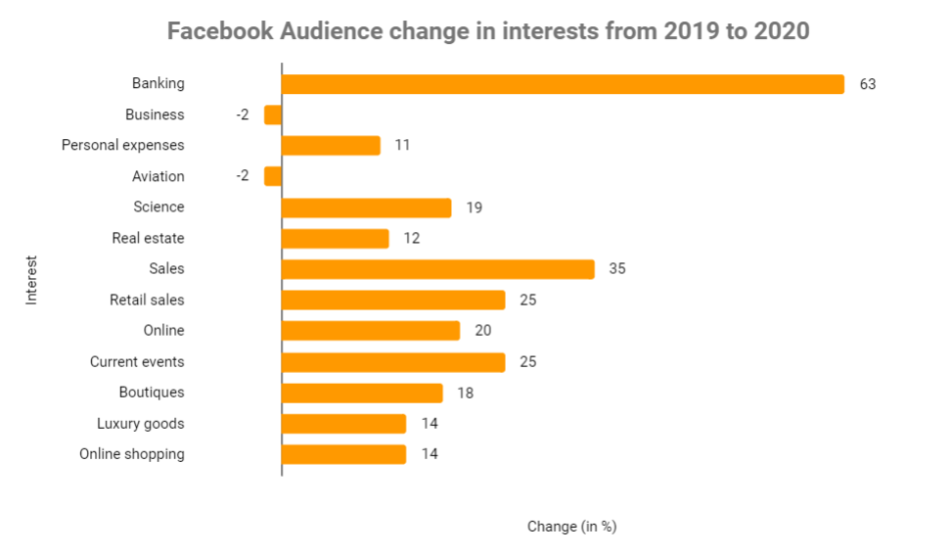
Tip: The division between some of these categories might not seem so clear, so we’ll break it down. Categories are based on whether or not you’ve interacted with content published by Facebook Pages that were categorized in that way. Basically, if you liked a post, an ad, or a Page by a social media company, you’re probably going to be placed in the “Online” category.
To compare our research on Facebook to website analytics, SimilarWeb has done a great job at tracking the changes in web traffic for March across industries. These are just a few of their findings:
- WHO has received over 252,000 visits in the last 28 days
- eCommerce and shopping have experienced a 0.53% decrease in traffic since the past week.
- Restaurants and delivery grew by 6.72% last week
- In agreement with Sotrender’s findings, travel and tourism (both accommodation and air travel) have had more than a 35% decrease in visitors
It’s worth mentioning that eCommerce related to certain B&M retailers had an 8.8% increase in their conversion rates compared to 2019. Despite the decrease in overall traffic, customers are making more online purchases.
The eCommerce situation is complicated
Since social distancing was implemented and many essential stores have limited working hours, customers have turned to online shopping to complete their orders.
Although some stocks have fallen since the last week, other stocks have started to rise – specifically stocks in the high-tech and home fitness exercise equipment industries.
Here’s what came up:
- Number of orders grew across all eCommerce categories by 35.6%
- Order volume increased for grocery merchants between 12/03 to 15/03.
- MarketWatch shows us that as of 24/03, Dick’s Sporting Goods Inc. (DKS) is up (+0.72+4.23%).
- Town Sports International Holdings Inc. (CLUB) is also doing well (+0.19+28.79%).
Using Google Trends, we were able to find some support that customers are making the most of eCommerce.
Continuing our use of Google Trends, we found that certain phrases and keywords experienced a surge in interest. For example, here’s what we saw when we looked up “buy groceries online”.
We can definitively say that some industries have piqued the interest of users worldwide. It will be interesting to see whether these trends will plateau or continue to grow in the coming weeks and potentially months.
Rise of mobile apps
Aside from grocery merchants directly delivering groceries, people also rely on delivery services such as Glovo, UberEats, and more specialized apps. This suggests that the food and dining industry still has opportunities to maintain sales.
 By the way, UberEats has decided to waive delivery and activation fees until the 31st of March (though there is speculation that they might extend this). This is not only beneficial for consumers, but for the restaurants as well. They’ll be able to save money, and potentially stay open for longer.
By the way, UberEats has decided to waive delivery and activation fees until the 31st of March (though there is speculation that they might extend this). This is not only beneficial for consumers, but for the restaurants as well. They’ll be able to save money, and potentially stay open for longer.
It’s not just delivery services that have benefited from this. Catering services are also making deliveries and drop-offs up to the customer’s doorstep. Typically, the customers who used a catering service were employees or people who didn’t have the time to cook regularly before coming to work. This catering service recognizes the utility and relevance of marketing their products as being accessible to those in their #homeoffice. They’re also making a smart decision about the copy in the ad since it’s a trending hashtag related to #stayathome.
Shopping apps
As you’ve seen the results of our research, there has been an increase in interest in luxury goods, retail sales, boutiques, and online shopping. This could suggest that we’re experiencing a red lipstick effect – which means that people still want to make nonessential, miscellaneous purchases as usual. It would be an advantage to brands like Nike or Ray-Bans since they can continue their social media marketing with augmented reality and their own apps. Customers can stay at home, “try on” the products, and order products online.
Industries shifting online
Industries that used to profit from customers visiting a location (studios, spas, gyms) have now moved their services to online spaces. For example, cosmetologists have started preparing ebooks and video tutorials to show their customers how they can take care of their skin in the meantime. Nail technicians and hairstylists have even posted video tutorials on social media to improve customers’ well-being in quarantine.
The health and fitness industry is doing its best to mitigate the financial consequences. Although you can’t visit a nearby gym or a nutritionist, health and fitness apps are starting to increase in ranking position in the App Store and Google Play. Some of the top recommended apps available are Endomondo, Pumatrac, and calorie counters.
Apart from asking their fans to download fitness apps, brands are also promoting online fitness events using Facebook and Instagram Live. Some trainers have managed to set up online classes through Zoom, Instagram or Facebook Live. Planet Fitness is a popular fitness center franchise, so it isn’t a surprise that they have increased the number of active ads over the last week.
Music industry
Another industry worth mentioning here is the entertainment industry. When it comes to music, hundreds of thousands of people wait every year to purchase festival and concert tickets for the summertime. This year, several larger gatherings have been postponed or canceled for the foreseeable future. Luckily for techno and EDM fans, their festivals have learned to adapt to using social media.
For example, Instytut, a music and art festival that takes place a few times a year in Poland, has a very active community, both on its Facebook Page and their closed Facebook group. The organizers decided to do the best they can under the circumstances and asked DJs to perform their sets over Facebook Live for free. The online “rave” had between 1,300 to 19,200 viewers, depending on the artist performing, and they encouraged the audience to use the hashtag #instytutimhere so they can stay “separated but together”.
We know there’s more value for the customers to attend an event in person. Still, online events such as these lead to positive outcomes:
- Fans, artists, and organizers can stay safe with social distancing
- The artists are still getting exposure
- The organizers’ efforts will be appreciated when they could have just called off the event altogether.
Film industry
The film industry has experienced similar obstacles. At this time, the Cannes Film Festival, E3, the release of Wonder Woman 1984 and Black Widow have all been delayed. As for the production itself, it seems that it will have to be put on hold for now.
Luckily, several studios have decided to release their cinematic content online. For example, some movies will have their premiere online.
The Lovebirds was supposed to be released in theaters by the 3rd of April, but it’ll be available on Netflix from the same date. That means that there won’t be a theatrical release to attend, although Warner Brothers might follow suit and stream Wonder Woman.
According to Morning Consult and Hollywood Reporter’s poll:
- 21% created an account on a streaming service and cited the outbreak as part of the reason why they chose to sign up now.
- 43% are more likely to stream movies at home
Overall, the possibility of online participation is good for accessibility. Businesses should think about incorporating this online trend beyond the quarantine period. Online and social media solutions also matter for those who can’t regularly attend in person.
Recommendations going forward
There is a great deal of uncertainty right now while hospitals, clinics, and pharmacies are struggling to provide medical supplies, and medical facilities are struggling to accommodate their patients. It’s crucial that companies (with the means and resources) materially support health and safety services where possible.
High fashion brands such as Ralph Lauren have donated 10 million USD to various charities and will be making 250,000 face masks and 25,000 hospital gowns.
Businesses can make impacts on the situation in different ways, not just by directly donating money. The Honest Company has pledged to donate infant and personal care products to Baby2Baby in 2020. This organization helps families get important supplies that are otherwise hard to come by.
Corporate social responsibility
Kantar’s research on consumer sentiment during the pandemic has proven to be insightful. Here are the numbers that businesses should pay attention to:
- 75% of respondents believe that companies shouldn’t be exploiting the crisis to promote themselves
- 8% of those respondents go as far as to say companies should stop advertising completely.
- 78% want companies to make sure their employees’ health is taken care of
Although some companies are still posting ads, others have been discouraged. Instead, they’ve decided to engage in Corporate Social Responsibility (CSR). It would be inappropriate and tone-deaf to try to exploit the pandemic for financial gain. However, for some companies, CSR might be the only way for a company to help the community and maintain brand awareness without losing respect for unethical behavior.
In times when the future of so many businesses is uncertain, companies should focus on internal communication even more than usual. It’s crucial that companies help their employees stay safe, provide support and reassurance.
At the end of the day, how the company treats its employees and clients during this point in time will matter most. It’ll be a sort of test whether they can uphold their reputation as being socially responsible and whether their brand values translate into real, tangible actions.
Advertising
As it has become impossible to organize a photoshoot or film a commercial on location, businesses might have to consider using animations and cartoons as a way to responsibly follow social distancing guidelines. What’s more, we don’t know the effect that this will have on more traditional ad spending (TV, radio) since ads are typically bought a month in advance. Therefore, we might soon witness an even larger transition from television to online in advertising.
Adapt to your new audience
By now, you should see that online trends and consumer behaviors are changing. Users are spending more time on social media than ever, and are increasingly more likely to take advantage of online offers and alternatives.
Our final recommendation would be to make use of analyses that will help you learn more about how your target demographic has changed. Since there are no solutions that will work for every brand, we recommend that you make data-driven decisions based on customized reporting tailored to your brand’s needs.
Sotrender’s Audience Interest Analysis
Although it is possible to have social media managers analyze some of their own profiles, they might not have as much experience as analysts. Facebook Insights and Google Analytics wouldn’t provide detailed information about how your target audience’s opinions of your brand have changed. Furthermore, social media managers may lack the time or resources to analyze their profiles and brand mentions across platforms.
This is where Sotrender comes in to quickly provide a report with all of this information. At Sotrender, we can provide aggregated data about this dynamic situation via our Audience Interest Analysis report, tailored specifically for your individual brand. Such a report would save your company time and allow you to focus on finding ways to implement recommendations based on these insights. Our report will allow your brand to:
- Monitor audience groups and see the trends have changed
- Learn how and where your brand’s content is consumed to adjust your current online strategy
- See where and how your target audience responds to brand mentions with sentiment analysis (across platforms as well as the web)
- Acquire aggregate data from Google API, Facebook and all web sites, forums, blogs, and more
If you’re interested in this offer or have any questions, our Sales Team will be happy to discuss the details with you. Feel free to leave your information in the contact form and we’ll get back to you!


